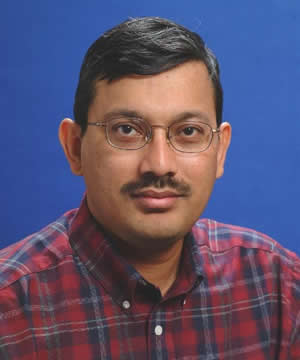|
|
               |
Keynote Speakers: Professor Mohammed Atiquzzaman Professor Matthew Warren
 |
Professor Mohammed Atiquzzaman
Edith Kinney Gaylord Presidential Professor
School of Computer Science
University of Oklahoma
USA
|
| Mobility Management and Security Issues for Networks in Motion |
Previous work on mobility management in data networks have mainly dealt with solutions regarding mobility of individual hosts. Various networks layer and transport layer solutions have been developed. However, recently there has been strong interest in finding solutions for networks in motion, such as networks in an aircraft, train or ship. As they move, rather than handing off individual hosts on such a network, it is more efficient to handover the networks between access points. This results in the handoff being transparent to the hosts and less control traffic in the resource challenged wireless networks. The talk with provide an overview of the network layer based solution being developed by the Internet Engineering Task Force and compare with the end-to-end based solution (SINEMO) being developed at University of Oklahoma in conjunction with the National Aeronautics and Space Administration for on networks in motion. Security issues and solutions for mobility management schemes will also be described. The application of networks in motion will be illustrated for both terrestrial and space environment. |
| Professor Mohammed Atiquzzaman's Bio |
Mohammed Atiquzzaman (Senior Member, IEEE) obtained his M.S. and Ph.D. in Electrical Engineering and Electronics from the University of Manchester (UK) in 1984 and 1987, respectively. He joined as an assistant professor in 1987 and was later promoted to senior lecturer and associate professor in 1995 and 1997, respectively. Since 2003, he has been a professor in the School of Computer Science at the University of Oklahoma.
Dr. Atiquzzaman is the editor-in-chief of Journal of Networks and Computer Applications, co-editor-in-chief of Computer Communications journal and serves on the editorial boards of IEEE Communications Magazine, International Journal on Wireless and Optical Communications, Real Time Imaging journal, Journal of Communication Systems, Communication Networks and Distributed Systems and Journal of Sensor Networks. He co-chaired the IEEE High Performance Switching and Routing Symposium (2003) and the SPIE Quality of Service over Next Generation Data Networks conferences (2001, 2002, 2003). He was the panels co-chair of INFOCOM’05, and is/has been in the program committee of many conferences such as INFOCOM, Globecom, ICCCN, Local Computer Networks, and serves on the review panels at the National Science Foundation. He received the NASA Group Achievement Award for "outstanding work to further NASA Glenn Research Center's effort in the area of Advanced Communications/Air Traffic Management's Fiber Optic Signal Distribution for Aeronautical Communications" project. He is the co-author of the book “Performance of TCP/IP over ATM networks” and has over 150 refereed publications, most of which can be accessed at www.cs.ou.edu/~atiq.
His current research interests are in areas of transport protocols, wireless and mobile networks, ad hoc networks, satellite networks, Quality of Service, and optical communications. His research has been funded by National Science Foundation (NSF), National Aeronautics and Space Administration (NASA), and U.S. Air Force.
|
 |
Professor Matthew Warren
Professor of Information Systems
School of Information Systems
Deakin University
Australia
|
| Security Risks of Social Networking Systems |
Social networking systems such as Facebook are an ever evolving and developing means of social interaction, which is not only being used to disseminate information to family, friends and colleagues but as a way of meeting and interacting with "strangers" through the advent of a large number of social applications. Social networking systems as well as being a way for those people who are isolated to interact with other people can also have a huge social and personal impact on some users. This personal information (not just factual data) including the thoughts and feelings of individuals can be used by others through social applications to cause emotional and psychological distress. The level of security and risk for all this personal information on social networking systems such as Facebook will be examined in the presentation, as well as the possible threats and ethical issues that could impact upon users. |
| Professor Matthew Warren's Bio |
Professor Matthew Warren is the Head of School and Professor of Information Systems at the School of Information Systems, Deakin University, Australia. He gained a PhD in Information Security Management (Security Risk Analysis Methods) from Plymouth University, UK. During his doctoral research, he worked on several large European Union Security research projects.
Professor Warren has received numerous grants and awards from national and international funding bodies: Australian Research Council (ARC); Engineering Physical Sciences Research Council (EPSRC) in the UK; National Research Foundation in South Africa and the European Union.
Professor Warren has gained international recognition for his scholarly work in the areas of Information Security, Risk Analysis, eBusiness and Critical Infrastructure Protection. He has authored and co-authored over 270 books, book chapters, journal papers and conference papers. Professor Warren has taught within Australia, Finland, Hong Kong and the UK.
|
|
|